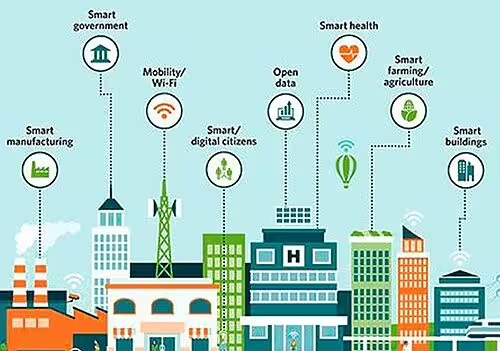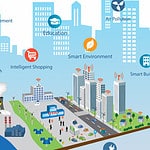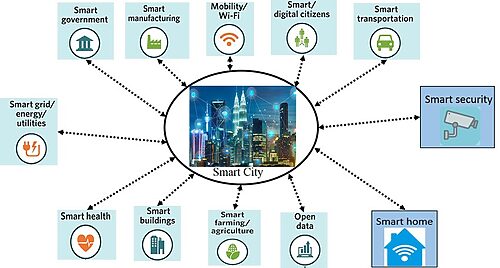Turn Finima into a Smart city

- Definition and significance of a smart city A smart city is a term used to describe a city that utilises technology and data to enhance the quality of life for its residents. It involves the integration of various digital technologies and infrastructure to improve efficiency, sustainability, and connectivity within the urban environment. The concept of smart cities has gained significant importance in recent years as cities around the world face various challenges such as rapid urbanisation, resource constraints, and the need for sustainable development.

- Overview of Finima and its current state Finima is a prime example of a smart city that is harnessing technology and data to transform the lives of its residents. Located in Nigeria, this city is at the forefront of embracing smart city solutions to address the unique challenges it faces. Currently, Finima is in the early stages of its smart city journey, but significant progress has already been made in implementing various initiatives. These initiatives focus on areas such as energy management, transportation, waste management, and public safety. By leveraging technology and data, Finima aims to create a sustainable, efficient, and connected urban environment that enhances the quality of life for its residents. One of the key aspects of Finima’s smart city initiatives is energy management. By integrating renewable energy sources and implementing smart grids, the city aims to reduce its carbon footprint and ensure a reliable and efficient energy supply. Additionally, Finima is investing in smart transportation solutions, such as intelligent traffic management systems and electric vehicle infrastructure, to improve mobility and reduce traffic congestion. The city is also implementing smart waste management systems, including sensor-based waste bins and automated waste collection, to optimise waste disposal processes and promote recycling. Lastly, Finima is prioritising public safety by utilising advanced surveillance systems, emergency response technologies, and data analytics to enhance security and emergency preparedness. Through these comprehensive smart city solutions, Finima is paving the way for a sustainable and efficient future. The integration of smart transportation and waste management systems improves the overall quality of life for residents and visitors, while also promoting eco-friendly practises. The focus on public safety ensures that the city remains a safe and secure place to live and work. By embracing technology and innovation, Finima is setting an example for other cities to follow in their pursuit of becoming smart and sustainable.
- Purpose and objectives of the research the purpose of this research is to explore the impact of smart city initiatives on the overall development and sustainability of Finima. The objectives of this study include analysing the effectiveness of the integrated smart transportation and waste management systems in improving the quality of life for residents and visitors. Additionally, the research aims to evaluate the role of technology and innovation in promoting eco-friendly practises and enhancing public safety in the city. By examining these aspects, this study seeks to provide valuable insights and recommendations for other cities looking to embark on their own smart and sustainable journeys. The analysis of the integrated smart transportation and waste management systems will involve assessing the reduction in traffic congestion and air pollution, as well as the efficiency of waste collection and disposal. Furthermore, the study will investigate how technology and innovation contribute to the reduction of carbon emissions and the promotion of sustainable practises, such as the use of electric vehicles and smart recycling bins. Through this research, valuable lessons can be learned for other cities interested in implementing similar smart initiatives to create a more liveable and sustainable environment for their residents and visitors. By analysing the impact of technology and innovation on carbon emissions and sustainable practises, this study aims to provide concrete evidence of how these initiatives can lead to a greener and more eco-friendly future. The findings of this research will not only benefit the city itself but also serve as a valuable resource for other urban areas looking to adopt similar measures. Ultimately, the goal is to inspire and encourage widespread adoption of smart initiatives that can collectively make a significant difference in addressing environmental challenges and improving the quality of life for all.
II. Background Information
- Explanation of the concept of smart cities A smart city is a concept that integrates technology and data-driven solutions to enhance the efficiency, sustainability, and liveability of urban areas. It involves the use of advanced technologies such as Internet of Things (IoT), artificial intelligence (AI), and big data analytics to optimise the management of various urban systems, including transportation, energy, waste management, and public services. By harnessing the power of these technologies, smart cities aim to improve resource utilisation, reduce environmental impact, enhance public safety, and enhance the overall quality of life for residents. The concept of smart cities has gained significant attention and momentum in recent years as governments and organisations recognise the potential benefits they can bring. With IoT devices and sensors placed throughout the city, data can be collected in real-time, allowing for better decision-making and more efficient operations. AI algorithms can process this data to identify patterns and make predictions, leading to proactive solutions and improved services. Additionally, big data analytics can provide valuable insights into urban trends and behaviours, helping city planners and policymakers create sustainable and inclusive environments. As the world becomes increasingly interconnected, smart cities have become a crucial component of the future urban landscape.
- Review of successful smart city projects worldwide Reveals the immense potential of harnessing data and technology to enhance the quality of life for residents. From Singapore’s integrated traffic management system to Barcelona’s smart lighting infrastructure, these projects have demonstrated the transformative power of smart city initiatives. By leveraging the power of AI and big data analytics, cities have been able to optimise resource allocation, reduce carbon emissions, and improve public safety. As a result, smart cities are not just a buzzword but a tangible reality that is shaping the future of urban living. With the implementation of smart city initiatives, citizens are experiencing a multitude of benefits. For instance, Singapore’s integrated traffic management system has significantly reduced traffic congestion, saving residents valuable time in their daily commute. Similarly, Barcelona’s smart lighting infrastructure has not only improved energy efficiency but also increased public safety by always providing well-lit streets. These successful projects highlight the immense potential of smart cities in enhancing the overall quality of life for urban dwellers.
- Identification of key components needed for a city to become smart Includes advanced technology infrastructure, data analytics capabilities, and effective governance. The implementation of sensors and Internet of Things (IoT) devices allows for real-time data collection and analysis, enabling cities to respond proactively to issues such as traffic congestion, waste management, and energy consumption. Additionally, the integration of smart grids and renewable energy sources can help reduce carbon emissions and create a more sustainable urban environment. Effective governance plays a crucial role in ensuring the smooth operation of a smart city, as it involves coordination among different stakeholders, data privacy protection, and citizen engagement. By leveraging these key components, cities can unlock their full potential and become more efficient, liveable, and environmentally friendly. For instance, implementing intelligent transportation systems can optimise traffic flow and reduce travel time, leading to less congestion and air pollution. Moreover, smart waste management systems can track and manage waste disposal, promoting recycling and reducing landfill usage. By harnessing the power of renewable energy sources and integrating them into smart grids, cities can decrease their reliance on fossil fuels, lower energy consumption, and decrease carbon emissions. However, to achieve these goals, effective governance is essential. This includes establishing regulations to protect data privacy, ensuring transparency in decision-making processes, and actively involving citizens in the planning and implementation of smart city initiatives. With proper governance, cities can fully embrace the potential of smart technologies and create sustainable and inclusive urban environments. By integrating smart grids with other innovative technologies such as renewable energy sources and electric vehicles, cities can not only reduce their carbon footprint but also enhance the overall quality of life for their residents. Moreover, well-governed smart city initiatives can foster economic growth, attract investment, and create new job opportunities in emerging sectors such as data analytics and IoT technology. Ultimately, proper governance is the key to unlocking the full potential of smart city initiatives and paving the way for a greener and smarter future.

III. Assessment of Finima’s Current Infrastructure
- Evaluation of existing technological infrastructure in Finima Revealed that it is not equipped to support the demands of a smart city. The city’s current infrastructure lacks the necessary connectivity, data management systems, and sensor networks required for effective implementation of smart technologies. This poses a significant challenge to the realisation of Finima’s smart city goals and highlights the need for substantial upgrades and investments in the city’s infrastructure. Without these improvements, Finima may struggle to fully harness the benefits of smart city initiatives and may fall behind other cities in terms of technological advancements and sustainable development.
- Analysis of current transportation systems, energy usage, and waste management This is crucial in identifying areas that require immediate attention and improvement. By understanding the existing infrastructure and its limitations, Finima can develop targeted strategies to optimise transportation networks, reduce energy consumption, and enhance waste management practises. This analysis will serve as a foundation for implementing innovative technologies and solutions that align with the city’s smart city goals.
- Identification of strengths and weaknesses in Finima’s infrastructure This will enable the city to prioritise investments and allocate resources effectively. By identifying the strengths, Finima can build upon existing assets and leverage them to further enhance the quality of life for its residents. Conversely, understanding weaknesses will allow the city to address critical areas that may hinder progress and development. This comprehensive assessment of the infrastructure will provide valuable insights for decision-makers and stakeholders, guiding them towards informed and strategic actions. it will also help prioritise investment and resources towards areas that have the greatest potential for improvement. By addressing these weaknesses, Finima can ensure a more efficient and sustainable city that meets the needs of its residents and businesses. Furthermore, the identification of strengths can be used to leverage existing assets and capabilities, allowing Finima to build upon its competitive advantages and attract further investment and development. Overall, this analysis of infrastructure strengths and weaknesses is crucial for Finima’s long-term success as a smart city.
IV. Potential Benefits of Turning Finima into a Smart City
- Improved efficiency and sustainability in energy consumption and resource management are some of the potential benefits of turning Finima into a smart city. By implementing advanced technologies and systems, such as smart grids and sensors, Finima can optimise its energy usage and reduce waste. This not only helps to conserve valuable resources but also lowers the city’s carbon footprint, contributing to a more sustainable future. Additionally, a smart city infrastructure enables better monitoring and control of energy consumption, allowing for more accurate billing and potentially reducing costs for residents and businesses.
- Enhanced mobility and transportation systems are another key benefit of a smart city infrastructure. By integrating advanced technologies like intelligent traffic management systems and real-time data analytics, Finima can improve the efficiency and reliability of its transportation network. This includes optimising traffic flow, reducing congestion, and providing real-time updates on public transportation schedules. As a result, residents and visitors can enjoy smoother and more convenient travel experiences, while also reducing their reliance on private vehicles and promoting sustainable modes of transportation such as cycling and public transit.
- Enhanced quality of life for residents through smart healthcare, education, and public safety systems can also be achieved through the implementation of smart city technologies. Smart healthcare systems can improve access to healthcare services, streamline patient care, and enable remote monitoring of patients’ health conditions. Smart education systems can enhance learning experiences through digital tools and personalised learning platforms. Additionally, smart public safety systems can enhance emergency response times, reduce crime rates, and improve overall community safety. By integrating these technologies into the fabric of a city, residents can benefit from a higher quality of life and a more efficient and effective delivery of essential services.
V. Proposed Strategies for Transforming Finima into a Smart City
- Development and integration of smart grid systems for efficient energy management – Implementation of smart transportation systems to improve traffic flow and reduce congestion – Deployment of smart waste management solutions to optimise waste collection and recycling processes – Adoption of smart water management techniques to conserve water resources and ensure sustainable usage – Installation of smart street lighting systems for energy efficiency and improved public safety – Establishment of a robust data analytics infrastructure to gather and analyse real-time data for better decision-making – Collaboration with local businesses and start-ups to foster innovation and develop new smart city technologies – Engagement with the community through awareness campaigns and education programmes to promote active participation and citizen involvement in the smart city transformation
– Implementation of advanced sensors and IoT devices to monitor and optimise traffic flow, reducing congestion and enhancing transportation efficiency. – Integration of renewable energy sources, such as solar panels, into the street lighting system to promote sustainability and decrease reliance on traditional power grids. – Implementing smart waste management systems that use sensors to optimise garbage collection routes and reduce environmental impact. – Enhancing public safety through the installation of CCTV cameras with facial recognition capabilities and real-time monitoring to detect and prevent criminal activities. – Developing mobile applications and platforms to provide citizens with real-time updates on public transportation schedules, emergency alerts, and community events.

- Implementation of intelligent transportation systems to alleviate traffic congestion and improve the overall efficiency of the city’s transportation network. This includes the deployment of smart traffic lights that can adjust timings based on real-time traffic conditions, as well as the integration of smart parking systems to help drivers locate available parking spaces more easily. Additionally, the implementation of a comprehensive public transportation system with real-time tracking and updates will encourage more residents to rely on sustainable modes of transportation, reducing the reliance on private vehicles and further easing traffic congestion. Furthermore, the use of intelligent transportation systems will enable the collection and analysis of data on traffic patterns, allowing for proactive measures to be taken to prevent bottlenecks and improve overall traffic flow. This can be achieved through the installation of sensors and cameras that monitor traffic and provide valuable insights for traffic management authorities. Moreover, promoting active transportation options such as cycling and walking through the construction of dedicated lanes and pedestrian-friendly infrastructure will not only alleviate traffic congestion but also contribute to a healthier and more sustainable urban environment.
- Adoption of smart waste management systems to reduce environmental impact is another crucial aspect of creating sustainable cities. Implementing waste sorting and recycling programmes along with the use of advanced technologies like waste-to-energy plants, can significantly minimises the amount of waste sent to landfills and decrease greenhouse gas emissions. Additionally, encouraging the use of renewable energy sources, such as solar panels and wind turbines, can further reduce the carbon footprint of a city and promote a greener future. By integrating these various strategies, cities can work towards achieving a more sustainable and liveable environment for their residents.
Discover more from FINIMA
Subscribe to get the latest posts sent to your email.
0 Comments